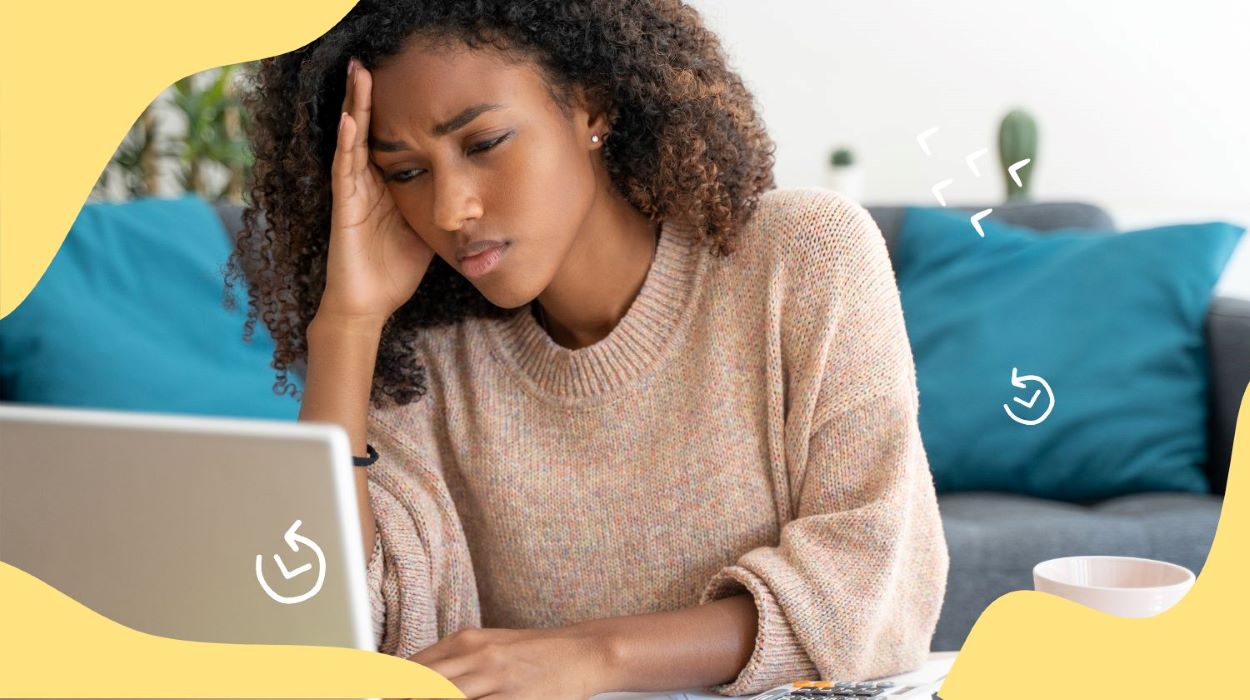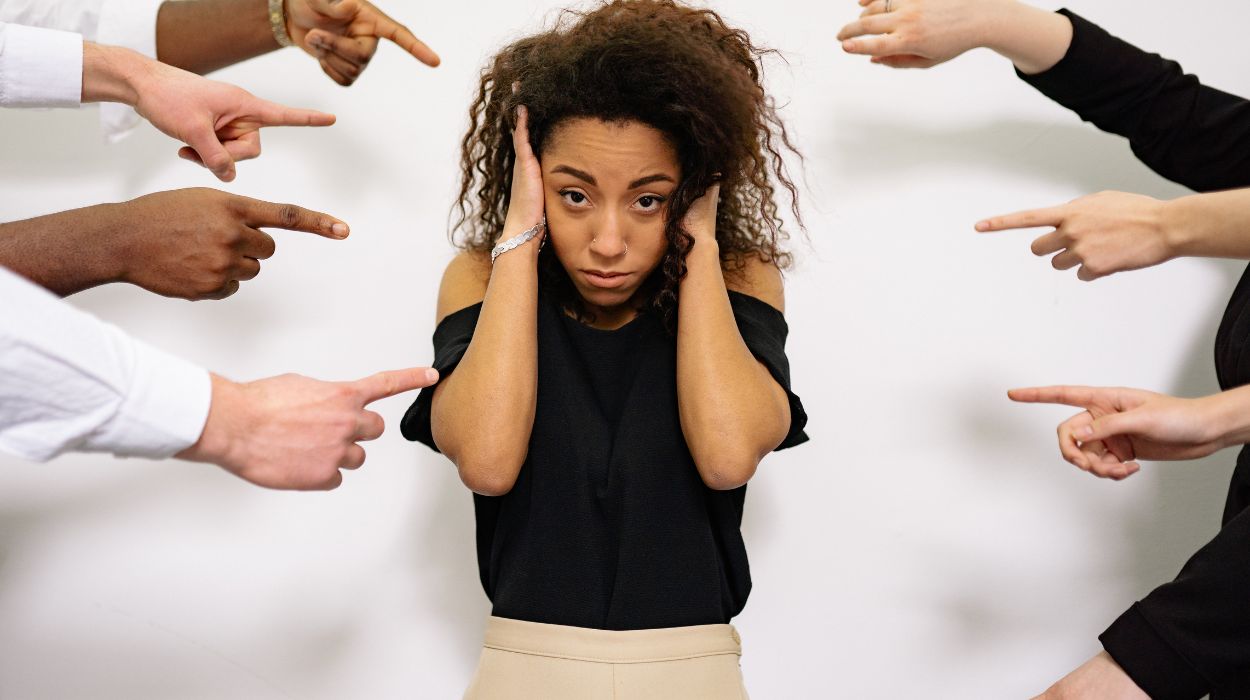 Evidence Based
Evidence Based
Evidence Based
This article is objectively based on relevant scientific literature, written by experienced medical writers, and fact-checked by a team of degreed medical experts.
Our team of registered dietitian nutritionists and licensed medical professionals seek to remain objective and unbiased while preserving the integrity of any scientific debate.
The articles contain evidence-based references from approved scientific sites. The numbers* in parentheses (*1,2,3) will take you to clickable links to our reputable sources.
Performance Anxiety: 3 Symptoms, Causes & Tips To Cope

Anxiety appears in many forms and affects individuals across various aspects of life. When intimate, academic, or professional situations trigger anxiety symptoms, they manifest as a debilitating fear of judgment, failure, or embarrassment. The impact of this performance anxiety is very disruptive to everyday life.
Severe performance anxiety is studied under the diagnosis of social anxiety disorder (SAD). Studies for treating performance anxiety are usually compartmentalized into each type such as test-taking anxiety or stage fright.
In this article, we will review the symptoms and treatments for the types of performance anxiety common today. We discuss current and popular natural treatments such as using CBD oil for anxiety and examine if it works for performance anxiety. Lastly, we will provide treatment strategies for conquering anxiety in social situations and even overcoming sexual performance anxiety.
Who Gets Performance Anxiety And When?
It is a normal and common occurrence to suffer performance anxiety at some point in your life. It arises in high-stakes situations, often with judgment involved. These people are:
- Artists and performers on stage.
- Athletes competing in sports events.
- Public speakers.
- Students during exams.
- Individuals in an intimate relationship.
- Job seekers at an interview.
What Is Performance Anxiety?

Performance anxiety is characterized by psychological or physical symptoms[1] like fear or nausea in anticipation of or during high-pressure events such as public speaking or performances, academic tests, intimate encounters, or times when you are evaluated.
The severity of performance anxiety varies, and not everyone has the same triggers or symptoms. Someone nervous or stressed in a challenging situation shares the same symptoms as someone diagnosed with SAD. However, SAD has more severe and persistent symptoms that consistently disrupt everyday life and provoke isolation and avoidance of social situations.
Causes Of Performance Anxiety
Performance anxiety arises from a combination of internal and external factors[2], making it challenging to pinpoint causes. Internal factors come from personal expectations, self-perception, physical status, and mood or personality such as low self-esteem, fear of failure, or perfectionism. Past experiences such as traumatic events or unresolved conflicts are internalized too.
Hormones can cause anxiety. Brain and body chemistry are involved with managing stress and dealing with social situations. Our physical and mental well-being are important to maintain and prevent unwanted stress and anxiety.
External factors come from the perceived pressure from others. An audience is expected to evaluate and criticize performances. Family members, friends, peers, and societal standards have expectations that place pressure on us. The fear of embarrassment or negative judgment can contribute to performance anxiety in social situations.
Symptoms Of Performance Anxiety
The range of symptoms and severity are different for each situation. Here is a list of common symptoms experienced with performance anxiety:
Physical Symptoms
- Quivering
- Embarrassment or feeling flushed and blushing
- Heart pounding and racing pulse
- Feeling dizzy or about to faint
- Sweating
- Diarrhea, nausea, or stomach ache
- Having the urge to urinate
- Muscle tension
Psychological Symptoms
- Fear of judgment, embarrassment, or failure
- Fear of talking with others
- Fear of physical symptoms that people may notice
- Avoiding social activities
- Self-doubt or low self-esteem
- Inability to focus or mind going blank
Social Anxiety Disorder
Most providers use the Diagnostic and Statistical Manual (DSM-5) criteria to diagnose social anxiety disorder, including these symptoms:
- Fear of social situations
- Continuous triggering of anxiety by social situations
- Exaggerated fear that is out of proportion to the seriousness of the threat posed by social citations
- Avoidance of social situations due to intense fear
- Impaired social or occupational functions
- The persistence of fear for six months
- The fear is not being attributed to any substance abuse
- Symptoms not explained by other mental illnesses
- Avoidance not related to other medical conditions such as Parkinson’s disease or obesity
Types Of Performance Anxiety
Stage Fright
This type of performance anxiety is experienced by individuals such as actors, athletes[3], musicians[4], or public speakers. Solo performers tend to suffer worse than group performers. Women are more likely to experience performance anxiety on stage. Sometimes, using coping mechanisms when experiencing stage fright can boost performance quality.
Sexual Performance Anxiety
Intimate relationships may lead to experiences of sexual performance anxiety characterized by fear related to sexual activities, such as erectile dysfunction (ED), premature ejaculation[5], or difficulty achieving orgasm. It can be difficult to determine the cause of dysfunction because disorders can lead to anxiety and vice versa.
Test Anxiety
Anxiety before or during an exam is common. Anxiety and stress come from high expectations and negative self-perception. Being well prepared[6] for the exam may reduce some physical symptoms but not the anticipatory anxiety.
Interview Anxiety

The stakes are high in a job interview[7] and individuals experience anxiety before or during them. There are high self-expectations and heightened anxiety from the perceived judgment and criticism of the interviewer.
Social Anxiety
Any social situation may become a trigger. Symptoms may be experienced at parties or networking events. Severe symptoms and avoidance of social situations are indications to see a medical professional for help.
How To Reduce Performance Anxiety
Although coping strategies are generally performed solo, a partner[8] from intimate relationships or group performances may help plan and deal with emotions. For example, musicians[9] can work through anxiety with their performance partners or a director. Coaches, team leaders, or therapists may facilitate communication.
In general, research divides coping strategies into three categories; sex, sports, and stage. Many remediation strategies overlap and are useful in more than one type of performance anxiety.
Mental Strategies
- Positive thinking or self-talk combats negative thoughts and improves focus, reducing anxiety.
- Mindfulness allows for non-judgmental self-reflection, keeping individuals present in the moment, especially during intimate encounters.
- Reflection on preparedness alleviates pre-performance fears.
- Concentrate on oneself to help forget about judgment and evaluation by an audience. With sexual encounters, the focus should be on how the self participates and responds to their partner. Focus on one’s own body reduces sexual stimulation.
- Conversations with mentors provide constructive criticism and feedback, reducing anxiety.
Physical Strategies
- Deep breathing techniques slow the heart rate and enhance focus.
- Skill acquisition and subconscious automation through extensive practice reduce future anxiety.
- Maintaining good sleep hygiene[10] reduces tiredness and anxiety.
- A proper diet prevents gastrointestinal symptoms and fatigue. Yogurt aids digestion, apple cider vinegar helps prevent erectile dysfunction, and a focus on macronutrients helps to sustain energy.
- Engaging in low- to moderate-intensity exercise helps distract from anxiety symptoms.
- Managing other health conditions properly keeps the body prepared and reduces symptoms.
- Avoiding alcohol and other substances prepares the body for optimal performance.
Treatment
Therapy
Therapy is useful to manage anxiety and other psychological issues. Cognitive behavioral therapy[11] is a common first choice for treatment and is just as effective as practicing mindfulness in reducing stress and anxiety symptoms.
Online therapy[12] is widely available. Studies support the use of either in-person or virtual sessions for social anxiety disorder. With the introduction of technology, there may be more tools for role play and simulation to facilitate therapy and reduce feelings of judgment. Check out our review of the best online therapy programs to learn more.
Medications
Mild symptoms should not require treatment with medications[13], and athletes are often prohibited from using medication. Most medications are prescriptions and not available over the counter.
- Chronic psychological disorders are managed with antidepressants, mood stabilizers, and antipsychotics.
- Benzodiazepines in low doses relieve anxiety symptoms quickly.
- Beta-blockers cano slow a racing heart from anxiety in low doses.
- Erectile dysfunction[14] is first treated by lifestyle modifications and treating underlying causes. Then, phosphodiesterase-5 inhibitors may be prescribed to aid an erection.
- Many over-the-counter supplements of vitamins and herbs claim to help with anxiety and sexual health, but have little evidence to support their claims. They may interact negatively with other medicines.
- CBD oil can be helpful for anxiety, although more studies are needed to determine its usefulness. While some evidence[15] supports the use of CBD for anxiety, studies do not have strong positive or negative evidence for its specific effect on sexual function yet.
Conclusion
Performance anxiety is a widespread challenge that affects individuals in various aspects of life, causing overwhelming fear of judgment and failure. To mitigate and manage performance anxiety symptoms, it is crucial to understand and implement the discussed recommendations.
Practice greatly reduces anxiety through preparedness and building confidence. Take care of yourself physically and emotionally to avoid confounding factors such as fatigue with poor sleep or diet.
Utilizing both physical and mental techniques can effectively manage and alleviate common symptoms of performance anxiety. Seeking guidance from medical professionals for therapy, medication, or overall symptom management is recommended. Remember that overcoming performance anxiety requires patience, persistence, and self-compassion. Embrace the journey as an opportunity for personal growth and future success by employing the right tools and mindset.
Frequently Asked Questions
Performance anxiety symptoms are more severe and lower the ability to function and perform.
If symptoms are overwhelming or you are avoiding social situations, you should seek professional help.
+ 15 sources
Health Canal avoids using tertiary references. We have strict sourcing guidelines and rely on peer-reviewed studies, academic researches from medical associations and institutions. To ensure the accuracy of articles in Health Canal, you can read more about the editorial process here
- Alomari, N.A., Bedaiwi, S.K., Ghasib, A.M., Kabbarah, A.J., Alnefaie, S.A., Hariri, N., Altammar, M.A., Fadhel, A.M. and Altowairqi, F.M. (2022). Social Anxiety Disorder: Associated Conditions and Therapeutic Approaches. [online] doi:https://doi.org/10.7759/cureus.32687.
- Rowland, D.L. and Jacques van Lankveld (2019). Anxiety and Performance in Sex, Sport, and Stage: Identifying Common Ground. [online] 10. doi:https://doi.org/10.3389/fpsyg.2019.01615.
- Ford, J., Ildefonso, K., Jones, M. and Monna Arvinen-Barrow (2017). Sport-related anxiety: current insights. [online] Volume 8, pp.205–212. doi:https://doi.org/10.2147/oajsm.s125845.
- Spahn, C., Krampe, F. and Manfred Nusseck (2021). Classifying Different Types of Music Performance Anxiety. [online] 12. doi:https://doi.org/10.3389/fpsyg.2021.538535.
- McMahon, C., Jannini, E.A., Ege Can Serefoglu and Wayne J.G. Hellstrom (2016). The pathophysiology of acquired premature ejaculation. [online] 5(4), pp.434–449. doi:https://doi.org/10.21037/tau.2016.07.06.
- object Object (2018). Does Increased Effort Compensate for Performance Debilitating Test Anxiety? Core.ac.uk. [online] doi:oai:pure.atira.dk:publications/66a38b36-a847-44bb-83bf-fd0f9678b63f.
- Dumsch, A. (2023). Interviewing with Social Anxiety – OITE Career Blog – NIH Office of Intramural – Training and education. [online] Nih.gov. Available at: https://oitecareersblog.od.nih.gov/2021/02/08/interviewing-with-social-anxiety/#:~:text=For%20those%20with%20social%20anxiety%20preparing%20for%20an%20interview%2C%20it,question%20for%20a%20moment.%E2%80%9D%20Sometimes.
- Rowland, D.L., Gene Margaret Moyle and Cooper, S.E. (2021). Remediation Strategies for Performance Anxiety across Sex, Sport and Stage: Identifying Common Approaches and a Unified Cognitive Model. [online] 18(19), pp.10160–10160. doi:https://doi.org/10.3390/ijerph181910160.
- Irie, N., Morijiri, Y. and Yoshie, M. (2023). Symptoms of and coping strategies for music performance anxiety through different time periods. [online] 14. doi:https://doi.org/10.3389/fpsyg.2023.1138922.
- Horenstein, A., Morrison, A.S., Goldin, P.R., Maia ten Brink, Gross, J.J. and Gross, J.J. (2019). Sleep quality and treatment of social anxiety disorder. [online] 32(4), pp.387–398. doi:https://doi.org/10.1080/10615806.2019.1617854.
- Goldin, P.R., Thurston, M.D., Allende, S., Moodie, C.A., Dixon, M., Gross, J.J. and Gross, J.J. (2021). Evaluation of Cognitive Behavioral Therapy vs Mindfulness Meditation in Brain Changes During Reappraisal and Acceptance Among Patients With Social Anxiety Disorder. [online] 78(10), pp.1134–1134. doi:https://doi.org/10.1001/jamapsychiatry.2021.1862.
- Paul, Meyerbröker, K. and Morina, N. (2020). Virtual Reality Therapy in Social Anxiety Disorder. [online] 22(7). doi:https://doi.org/10.1007/s11920-020-01156-1.
- Williams, T., Hattingh, C.J., Kariuki, C., Tromp, S., Anton, Ipser, J.C. and Stein, D.J. (2017). Pharmacotherapy for social anxiety disorder (SAnD). [online] 2019(1). doi:https://doi.org/10.1002/14651858.cd001206.pub3.
- REW, K.T. and HEIDELBAUGH, J.J. (2016). Erectile Dysfunction. American Family Physician, [online] 94(10), pp.820–827. Available at: https://www.aafp.org/pubs/afp/issues/2016/1115/p820.html?crsi=66249689&cicada_org_src=healthwebmagazine.com&cicada_org_mdm=direct.
- Huestis, M.A., Solimini, R., Pichini, S., Pacifici, R., Carlier, J. and Francesco Paolo Busardò (2019). Cannabidiol Adverse Effects and Toxicity. [online] 17(10), pp.974–989. doi:https://doi.org/10.2174/1570159×17666190603171901.



